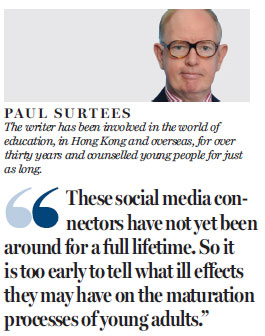This Peter Pan generation is quite unlike its forebears
Updated: 2016-01-28 08:42
By Paul Surtees(HK Edition)
|
|||||||
Are many of the members of "Generation Y" (say, those now aged 25 to 35) slower to mature than those who went before? Looking back two or three generations, those many young adults who migrated to Hong Kong from the North, in the second half of the last century, bravely toiled hard here to make a better life for themselves. Their perseverance and hardy resolve paid off. Fortunately, many of them eventually did achieve a better life here for themselves and for their children and grandchildren. Now that these grandchildren are reaching working age, it is salutary to note how slow many of today's youngsters are to exhibit similar take-charge adult behavior, even by the time they approach their 40s.
Great strides have been made in providing a good education - right up to the university level - now available to all. However, the shortage of campus accommodation for Hong Kong undergraduates means that most of them commute to university from the family home. The "rite of passage" of leaving home for study is therefore not experienced. The scarcity of nice flats which are affordable to those entering the workforce means that in Hong Kong, unlike in many other advanced societies, youngsters can rarely leave the family home to share a flat with their friends. Even those getting married are often constrained to continue living in one of their parents' family dwellings. Those not getting married, or getting married much later in life - and these two groups together represent a sizable proportion - often stay living with their parents until they reach middle age, or beyond, themselves.
Because of Hong Kong's outstanding public transport and relatively small geographical area, no matter where you live here, you are almost always within daily commuting distance of your workplace. That factor means few people joining the Hong Kong workforce need to leave the family nest to live nearer to their place of work. It is obviously cheaper, and for many much more convenient, to remain living in the family home as they start their careers. So, the maturity and independence that comes from having your own home, away from parents, is achieved only later in life for many of today's young adults. Indeed, for quite a few, such independent living is a dream that is never achieved.
It is well understood that today's youngsters, the Internet generation, are savvy to all the varied means of social media communication - although, in many cases, their abiding obsession with their iPhone prevents them from developing adequate face-to-face social skills with other people. It also inadvertently inhibits their ability to walk around, or even to drive, safely, because their eyes are constantly pointed downward, to that little screen through which almost all their life experiences are channeled! By such constant active connection, mostly with trivia, silent moments of quiet reflection (which can lead to maturity) become all too rare.
As I visit various Hong Kong offices, I am often amused to see collections of Hello Kitty toys and the like decorating the desk space of employees who are well past childhood - in terms of their age, at least! The commonplace but childish obsession with cartoons, such as manga and anime, is another reflection of this slow-to-mature generation of Peter Pans. Recent research in Italy and Australia, among other countries, has shown links between playing violent video games and aggression, anti-social behavior, lack of interest in social or extra curricular activities, decreased self-control, obesity, immaturity when facing adult moral choices, and much else besides that is worrying. Any local parent can relate tales of their sullen teenage offspring eschewing joining family outings or other social gatherings, as their youngsters prefer to continue with time spent alone with their screens.
Some studies have gone on to propose that children and young people should not have more than two hours a day of screen time, with the rest of their time being better utilized in interacting with other real people. That two hours a day includes playing video games, watching TV, surfing the Internet, chatting on social media, e-mailing, texting, and having conversations or other interactions on their iPhones. You need only look on any Hong Kong street, bus or MTR train to realize that these suggested limits are being greatly exceeded by the constantly connected young members of the Internet generation.
These social media connectors have not yet been around for a full lifetime. So it is too early to tell what ill effects they may have on the maturation processes of young adults. But the social-living factors outlined above, when combined with these small-screen obsessions, will likely over time shape the life outlook and personality of these Peter Pans.

(HK Edition 01/28/2016 page9)